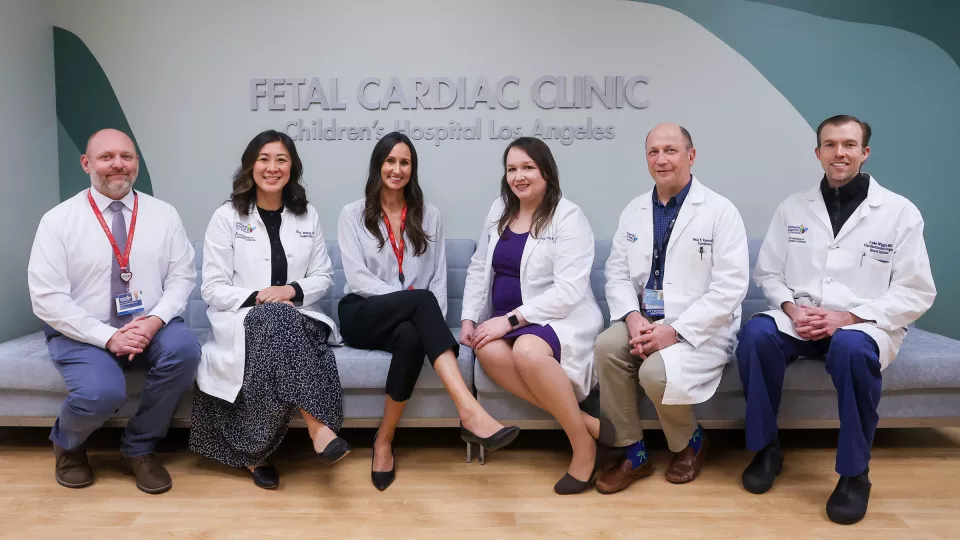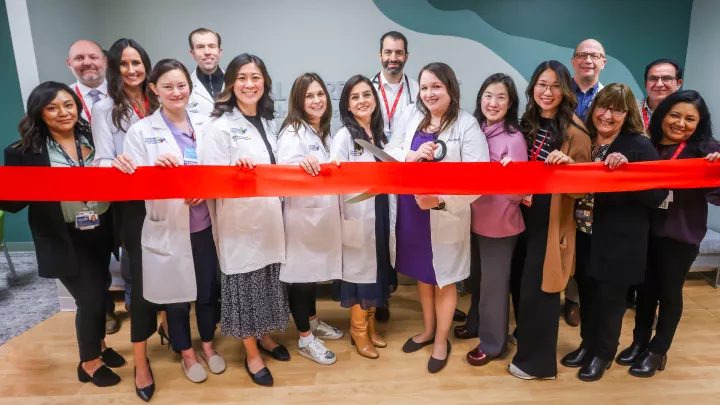
Heart Institute team members from left to right: David Romberger, RN, MSN, CCRN; Shuo Wang, MD; Jennifer Klunder, MHA; Jodie Votava-Smith, MD; Paul F. Kantor, MBBCh, MSc, FRCPC; Luke Wiggins, MD
Q&A: Advancing Fetal Cardiology Care for Babies and Families
Last year, Children’s Hospital Los Angeles opened a new, state-of-the-art Fetal Cardiac Clinic, which saw nearly 1,000 patients in its first year. CHLA is a leader in caring for babies with complex heart defects, providing comprehensive care from prenatal diagnosis through birth and beyond.
Jodie Votava-Smith, MD, Director of the Fetal Cardiology Program in the Heart Institute at Children’s Hospital Los Angeles, shares the newest research and advances in caring for these moms and babies—including a novel way to measure placental health and a new technology to image the fetal heart.
What kinds of patients do you see at the Fetal Cardiac Clinic?
We see a wide variety of patients, but we specialize in complex congenital heart disease. Our Cardiothoracic Surgery Program is one of the highest-volume programs in the country, performing over 850 surgeries a year. More than 20% of those heart surgery patients are neonates, and more than half of our neonatal surgeries are high-complexity cases.
So, our whole team has deep expertise with these highly complex cases, and we provide comprehensive care for the families. Right from the time we meet a family during pregnancy—as early as the second trimester—we explain the heart defect and how it will impact the pregnancy, delivery, and postnatal care of the baby. We also set out what we expect to be the long-term outcomes for the child.
For most complex heart defects, we will meet with the families several times over the course of the pregnancy. If a cardiac procedure is planned after birth, families are also able to meet with the heart surgeon or interventional cardiologist before the baby is born.
CHLA has a robust placental research program. What are you learning?
One of the exciting things our team is working on is developing a way to measure the health of the placenta during pregnancy. Our research team, led by Dr. Vidya Rajagopalan, was the first to show that measuring the placenta’s response to changes in the mother’s oxygen levels could serve as a kind of functional probe of placental health—while being completely noninvasive and safe for mom and baby.
Our team is also studying how the placenta impacts fetal brain development in congenital heart disease, and how it is affected by maternal health factors that may be modifiable. In addition, CHLA has a Placenta Biobank that allows mothers to donate placental and umbilical cord tissues after birth. Researchers can then study these tissues in a variety of conditions to better understand this critical organ.
How will low-field MRI improve fetal cardiac imaging?
Low-field MRI is a new way to look at the fetal heart, and we have some incredible imaging data. Two years ago, CHLA published groundbreaking work demonstrating that low-field MRI could image the human fetal heart in real time—without the use of cardiac synchronization.
We recently opened our new Cardiac Imaging Suite and became the first pediatric hospital in the country to have a 0.55 Tesla MRI. The lower magnetic field strength allows MRI to image organs and structures involving air and motion. This includes the heart and lungs, as well as the fetus. We are actively conducting research on this promising imaging technique.
While ultrasound is excellent, it’s imperfect in certain situations. Low-field MRI will be an additional imaging modality to help with diagnosis and with understanding the underpinnings of heart defects.
How are you optimizing neurodevelopmental outcomes for babies with heart disease?
This has long been a major focus for our team and our research. We now routinely provide preoperative brain MRI in our Cardiothoracic ICU—as well as abbreviated EEG monitoring for babies who have had complex heart surgeries—to monitor patients during the highest-risk time. We also partner with our Newborn Follow-up Program to closely track each baby’s development over the first few years of life, so that we can initiate early interventions when needed.
We’re involved in several research studies in this area. For example, one of our nurse researchers is studying whether babies with congenital heart disease have dysregulated blood flow in their brains—and if that is linked to a greater risk of developmental delays.
On a national level, CHLA is part of the multicenter COMPASS trial, which compares outcomes for babies who receive either a shunt or a stent for certain heart defects. That trial now has an ancillary study that will compare neurodevelopmental outcomes of babies who receive these interventions.
Why is mental health support important for these moms and families?
Learning that your unborn baby may have a heart condition is incredibly stressful and traumatic. CHLA recently hired a new full-time psychologist who is dedicated to supporting parent mental health, which we know is important for mothers, fathers, and their babies. We’re also partnering with lactation specialists who work with moms after the birth under these stressful conditions.
We look comprehensively at the whole patient and family. This can be a difficult journey for families, but we support them every step of the way.


